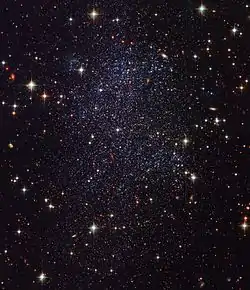Sagittarius Dwarf Irregular Galaxy
The Sagittarius Dwarf Irregular Galaxy (SagDIG) is a dwarf galaxy in the constellation of Sagittarius. (SagDIG should not be confused with the Sagittarius Dwarf Spheroidal Galaxy, SagDEG, a satellite galaxy of the Milky Way discovered decades later in the same constellation.) It lies about 3.4 million light-years away. It was discovered by Cesarsky et al. on a photographic plate taken for the ESO (B) Atlas on 13 June 1977 using the ESO 1 meter Schmidt telescope.
| SagDIG | |
|---|---|
 SagDIG by Hubble Space Telescope | |
| Observation data (J2000 epoch) | |
| Constellation | Sagittarius |
| Right ascension | 19h 29m 59.0s[1] |
| Declination | −17° 40′ 41″[1] |
| Redshift | −79±1 km/s[1] |
| Distance | 3.39±0.23 Mly (1.04±0.07 Mpc)[2][3] |
| Apparent magnitude (V) | 15.5[1] |
| Characteristics | |
| Type | IB(s)m[1] V (Dwarf irregular galaxy) |
| Apparent size (V) | 2.9′ × 2.1′[1] |
| Other designations | |
| Sagittarius Dwarf Irregular,[1] SGR Dwarf,[1] ESO594-G004,[1] PGC 63287,[1] Kowal's Object[1] | |
The SagDIG is thought to be the member of the Local Group most remote from the Local Group's barycenter. It is only slightly outside the zero-velocity surface of the Local Group.[4]
SagDIG is a much more luminous galaxy than the Aquarius Dwarf and it has been through a prolonged period of star formation.[5] This has resulted in it containing a rich intermediate-age population of stars. Twenty-seven candidate carbon stars have been identified inside SagDIG. Analysis shows that the underlying stellar population of SagDIG is metal-poor (at least [Fe/H] ≤ −1.3). Further, the population is young, with the most likely average age between 4 and 8 billion years for the dominant population.[6]
References
- "NASA/IPAC Extragalactic Database". Results for Sagittarius Dwarf Irregular. Retrieved 2007-03-15.
- Karachentsev, I.D.; Karachentseva, V.E.; Hutchmeier, W.K.; Makarov, D.I. (2004). "A Catalog of Neighboring Galaxies". Astronomical Journal. 127 (4): 2031–2068. Bibcode:2004AJ....127.2031K. doi:10.1086/382905.
- Karachentsev, I.D.; Kashibadze, O.G. (2006). "Masses of the local group and of the M81 group estimated from distortions in the local velocity field". Astrophysics. 49 (1): 3–18. Bibcode:2006Ap.....49....3K. doi:10.1007/s10511-006-0002-6. S2CID 120973010.
- van den Bergh, Sidney (April 2000). "Updated Information on the Local Group". The Publications of the Astronomical Society of the Pacific. 112 (770): 529–536. arXiv:astro-ph/0001040. Bibcode:2000PASP..112..529V. doi:10.1086/316548. S2CID 1805423.
- Momany et al. 2005.
- Gullieuszik, M.; Rejkuba, M.; Cioni, M. R.; Habing, H. J.; Held, E. V. (November 2007). "Near-infrared photometry of carbon stars in the Sagittarius dwarf irregular galaxy and DDO 210". Astronomy and Astrophysics. 475 (2): 467–477. arXiv:0709.0918. Bibcode:2007A&A...475..467G. doi:10.1051/0004-6361:20066848. S2CID 15437439.
External links
- The Sagittarius Dwarf Irregular Galaxy on WikiSky: DSS2, SDSS, GALEX, IRAS, Hydrogen α, X-Ray, Astrophoto, Sky Map, Articles and images